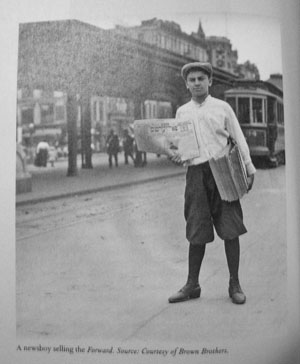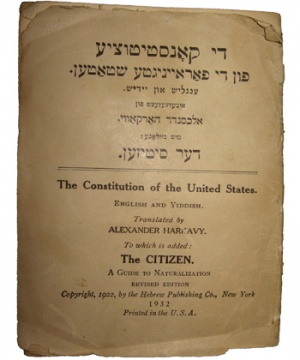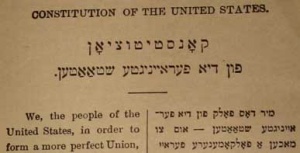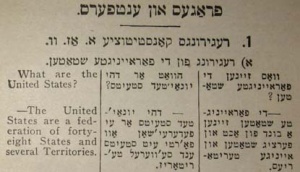From The Peopling of New York City
Contents |
Language of Jewish Immigrants
Most of the Jews who arrived from Eastern Europe spoke Yiddish, a language composed of German, Hebrew, and other East European languages. Some Sephardic Jews spoke Ladino, a mixture of Spanish and Hebrew.
Although European Jewish immigrants came from many different areas of Europe, they all spoke some form of Yiddish. The dialect varied from place to place, but for the most part Yiddish was a language comprised mostly of German, with some Hebrew and a little bit of the local language. Some Jews who came from small shtetlach (villages) with high percentages of Jews did not even speak the country's language. Yiddish became a common language through which Jews of all nationalities could communicate.
Like many immigrant groups, Jews from Europe brought their language with them. Manhattan's Lower East Side, the first destination for most Jewish immigrants, exhibited a prevalence of Yiddish to rival any shtetl. Storefronts emblazoned with Yiddish slogans advertised everything from food to clothing to religious articles. Peddlers hawked their wares, inviting customers to take advantage of a metziah (bargain). There was a thriving culture of Yiddish theater, which showed classics in Yiddish, as well as original titles. Yiddish newspapers battled each other for readership, with dailies, weeklies and monthlies being snapped up as fast as they could be printed.
Learn Yiddish
Written in Hebrew letters, Yiddish is a language known for its attitude and wisdom. It is rife with expressions and sayings that comment on almost any imaginable situation. Understandably, there are many adages dealing with wealth and poverty, as well as wisdom and foolishness. Of course, Yiddish terms and expressions often stem from the Torah (Hebrew scriptures) or other religious writings. By now, many Yiddishisms have become part of English as well. A list of words particularly characteristic of the Yiddish language follows.
Words and Phrases
Pronunciation note: 'kh' is a voiceless uvular fricative; a guttural sound between 'h' and 'k'
khutzpah—gall, audacity, brazenness: "The automobile industry CEO's had a lot of khutzpah to fly their private planes and then ask for a bailout."
hock a chinik—(lit. knock a teapot) to bluster or rant without purpose or result. Originates from the idea that an object shaken in an empty container makes noise, but a full container is quiet when shaken. (i.e. those with the least substance and sense in their opinions make the biggest commotion). "Stop hocking a chinik" means "Stop spewing, you're talking nonsense."
klutz—(lit. log) a clumsy person.
kvetch—to complain, often incessantly and about small issues.
mamish—actual, veritable (from Hebrew mamashut, substance); often used as an intensifier: "Our old classroom was mamish a furnace when the sun shined in."
mench—(lit. a man) a decent, upstanding, good-mannered person: "When you play competitive sports, try to win, but always be a mench." (see blockquote in Jewish Immigrants and Assimilation)
metsiah—a bargain; (from Hebrew, a found object). A metsiah far ganev is a really good bargain (lit. a bargain for a thief; from Hebrew ganev, thief).
nakhes—a feeling of accomplishment and pride in one's own handiwork, often said of parents' pride in their children's achievements: "David's scholastic achievements were a continual source of nakhes to his parents."
nischt ahin nischt aher—neither here nor there (nischt meaning 'not'); said of something in between states: "We have some enemies and some allies, but most countries are nischt ahin nischt aher." or "The periodic table is divided into metals and nonmetals, but metalloids are nischt ahin nischt aher."
JOKE: Q:What do you get when you cross a chicken with a rabbit?
A:I don't know, but it's nischt a hen, nischt a hare.
nu—an interjection, often indicating impatience or reluctant acceptance, similar to "well?" or "oh, well.": "Nu, hurry up, we need to leave soon." or "I forgot to hand in my paper today—nu, I can still hand it in tomorrow."
punct—(lit. point) exactly at the wrong place or time, out of many preferable options: "For weeks it was good whether, and punct when I had vacation it got cold and rainy." or "The teacher took attendance punct the day I came late."
shlep—drag or lug, often in a clumsy awkward way: "I'd rather take a cab from the airport than shlep my big suitcases on the subway."
shmooze—to chat or make small talk;(from Hebrew shemuot, hearings)
shkoyakh—good job, well done; (from Hebrew yiyasher kokhakha, may your strength be straightened)
shtetl—small town or village, diminutive of shtodt, city
stam—ordinary, plain, unmodified, without reason: "I went to the exhibit everyone was raving about, but I thought it was very stam." or "Why did you take a different route home today? Stam."
vi a lokh in kop—like a whole in the head; said of something detrimental in the current situation: "I need a hot tea in July vi a lokh in kop."
yid—a Jew; (from Hebrew Yehuda, Judah.)
Greetings and Partings
sholom aleichem—(lit. peace upon you), a greeting, such as "how are you?"; often when meeting someone for the first time or after a long absence. The proper response is aleichem sholom.
vos tutsakh/vos nayes—What's doing/What's new; informal.
zeit gezunt/zeit gebenched—Be healthy/Be blessed; parting wishes for good fortune.
Sayings
Der vos farshteyt zein narishkeit iz a kluger mench.
He who is aware of his foolishness is a wise person.
A shvaygediker naar iz a halber khokhem.
A silent fool is half a sage.
Nit geret iz oykh geret.
Not speaking is also speaking.
Der lebn iz nit mer vi a kholem, ober vekt mikh nit uf!
Life is nothing but a dream, but don't wake me up!
Di yungt iz a feler, di menlekhe yorn a kamf, un der elter a kharota.
Youth is a mistake, middle age a battle, and old age a regret.
“Odem yesodo meofer vesofo leofer,” beyno uveyno iz gut a trink bronfn.
"A man comes from the dust and in the dust he will end"—in the meantime a drink of vodka is nice. [The quote is from holiday prayers.]
Az me hot gelt iz men klug un shayn un men ken fein zingen.
When you have money, you're smart and good looking and you sing well, too.



